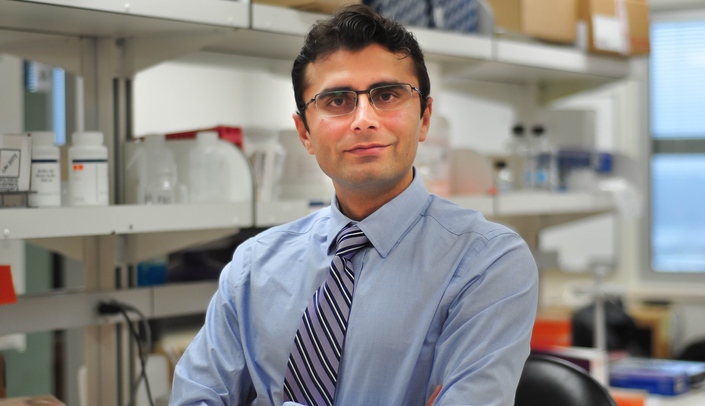The University of Nebraska Medical Center has established itself as one of the leading research centers in the country for pancreatic cancer – perhaps the most deadly form of cancer.
Taking on pancreatic cancer is a monumental task. It’s estimated that 92 percent of people diagnosed with pancreas cancer will die within five years.
Thankfully, incremental strides are being made.
One of the recent breakthroughs was reported earlier this month in Nature Medicine, and a UNMC research team under the direction of Pankaj Singh, Ph.D., professor, Eppley Institute for Research in Cancer and Allied Diseases, played a key role in the discovery.
The study, which was headed by Channing Der, Ph.D., of the Lineberger Comprehensive Cancer Center at the University of North Carolina at Chapel Hill, looked at how pancreatic tumors grow and tried to determine if this growth could be inhibited.
A gene known as KRAS is found activated in about 97 percent of pancreatic tumors. KRAS is one tough customer – it does not respond to any drug treatment – even though the National Cancer Institute has been targeting KRAS for several decades. Another key player in pancreatic cancer is a signaling modulator – known as ERK – which is activated by KRAS.
“Pancreatic cancer cells must feed themselves to grow,” Dr. Singh said. “When these cells are under stress – to sustain themselves – they have to start eating parts of themselves. It’s a process called autophagy, and it’s common with lots of cancer types.”
There are many ways by which cancer cells can feed themselves, but researchers knew they had to stop the autophagy process to stop the growth of cancer cells, Dr. Singh said. They did this by combining an ERK inhibitor with chloroquine, a drug used for treating malaria that is known to be an autophagy inhibitor.
Dr. Singh’s research team performed metabolomic analyses of pancreatic cancer cells that helped identify the role of autophagy in allowing cells to grow despite ERK inhibition.
“We helped prove that autophagy allows the cancer cells to survive the therapy,” Dr. Singh said. “By targeting autophagy, we were able to eliminate the escape route that pancreatic cells utilize to survive.”
The bottom line – the combination of pharmacologic inhibitors was able to mediate antitumor activity in the KRAS-driven pancreatic cancer cells. The inhibitors concurrently blocked both the ERK and autophagy processes and could potentially be an effective treatment for pancreatic cancer.
Dr. Singh said the combination of ERK inhibitors with chloroquine produced “very good synergy” in the potential elimination of tumors.
Two additional studies were published, he said. One of the studies took place at the University of Utah School of Medicine, where clinical trials have been initiated on patients with pancreas cancer.
Other members of Dr. Singh’s research team at the Eppley Institute included: Venugopal Gunda, Ph.D., research instructor; Nina Chaika, research technologist; and Gennifer Goode, Ph.D. Dr. Goode is currently working at Vanderbilt University in Nashville, Tenn.
We are Nebraska Medicine and UNMC. Our mission is to lead the world in transforming lives to create a healthy future for all individuals and communities through premier educational programs, innovative research and extraordinary patient care.
Twitter | Facebook | Instagram | YouTube | Flickr
UNMC research team plays key role in pancreatic cancer discovery
- Written by Tom O'Connor
- Published Mar 20, 2019

Pankaj Singh, Ph.D.
Media Contact
Tom O'Connor
UNMC Public Relations
(402) 559-4690 (office)
(402) 650-7063 (cell)
toconnor@unmc.edu